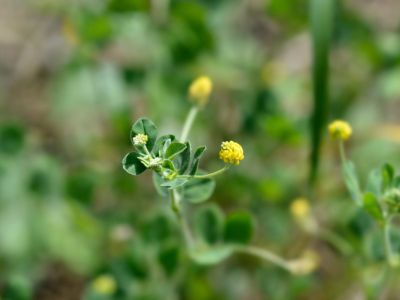Identification of Black Medic Weed
Black medic (Medicago lupulina) is considered an annual clover (but is not part of the clover genus). It has the teardrop-shaped leaves that are often found on clovers but, unlike other clovers, has yellow flowers. It is normally an annual, but in some warmer areas it can survive for several years before dying. Like many clovers, the leaves grow in groups of three and are oval shaped. Small pom-pom like yellow flowers will bloom off stems that grow off of the stem of each group of leaves.
How to Get Rid of Black Medic
Before you start spraying chemicals or getting on your hands and knees to remove black medic, you should first understand the conditions that black medic weed likes to grow in. Black medic grows in compacted soil. This is why you most commonly find it growing by the roadside or next to sidewalks, where soil has been compacted by wheel and foot traffic. If you find it in the middle of your lawn or flower bed, you may be able to get rid of black medic for good simply by correcting your over compacted soil. In other words, black medic weed is an indicator that your soil has problems. You can correct compacted soil by using a machine to aerate the soil or by amending the soil with additional organic material. Oftentimes, just taking steps to aerate the soil will not only remove black medic but will result in a healthier lawn and flower bed. If mechanical aeration or amending the soil is not possible or does not fully succeed at getting rid of black medic, you can fall back on more traditional methods of weed control. On the organic side, you can use manual pulling for black medic control. Since the plant grows from a central location, hand weeding black medic can be very effective and remove it from large areas in a short time. On the chemical side, you can use non-selective weed killers to kill black medic. Please be aware that non-selective weed killers will kill any plant that they come in contact with and you should be careful when using it around plants you wish to keep. Note: Chemical control should only be used as a last resort, as organic approaches are safer and much more environmentally friendly.
